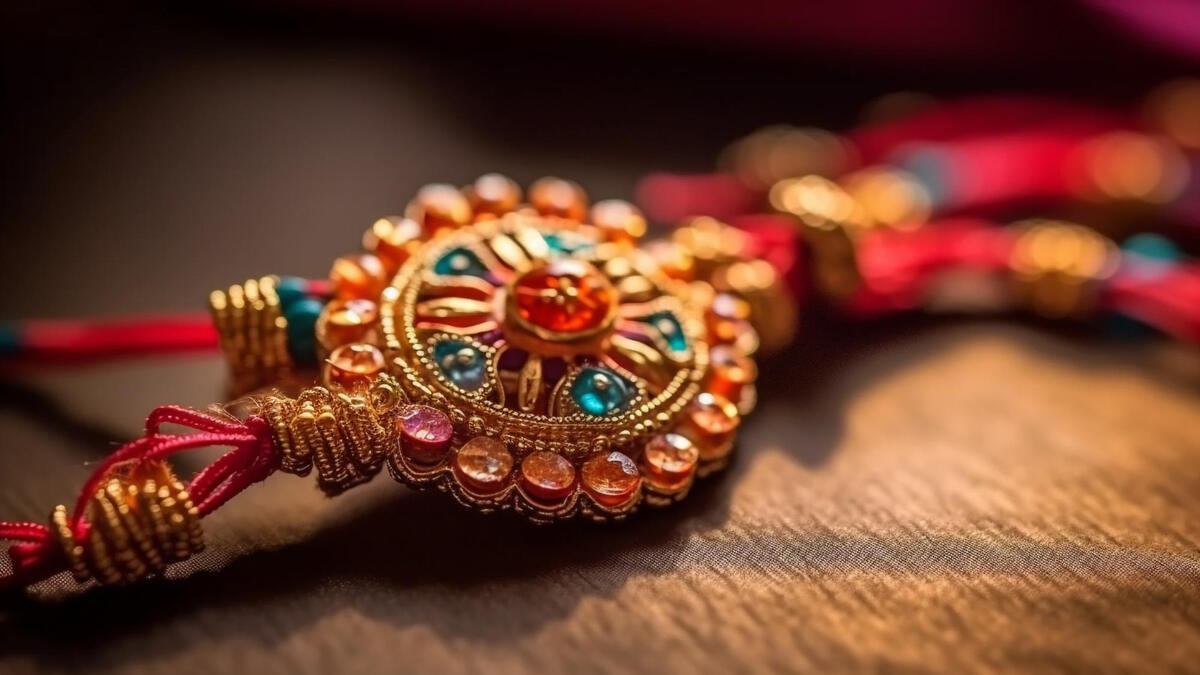
Raksha Bandhan, the festival that celebrates the bond between brothers and sisters, is widely cherished and observed across India. However, in some villages in Uttar Pradesh, this heartwarming tradition is notably absent. Let's explore the intriguing reasons behind why these communities choose not to celebrate Raksha Bandhan.

Imagine a village where sisters don't tie rakhis on their brothers' wrists, but instead, they adorn wooden sticks. In Satha Chaurasi, a cluster of around 60 villages in Hapur district, this unconventional tradition has persisted for almost 450 years.
The residents here proudly trace their lineage back to the 17th generation of Maharana Pratap, the revered Hindu Rajput king known for his valour. The origin story of this practise dates back to the battle of Haldighati in 1576. During this historic battle, all men were on the battlefield and couldn't partake in Raksha Bandhan. In a clever adaptation, the women tied rakhis to wooden sticks as a symbolic gesture of protection. This tradition, known as 'Chhadi Puja,' still flourishes today and is celebrated with a local fair.
In Surana village in Meerut, Raksha Bandhan (Celebrate Raksha Bandhan In Style With These Beautiful Mehndi Designs) has been abandoned due to a dark curse. According to local legends, in the late 12th century, Muhammad Ghori attacked the village on the day of the festival, resulting in the deaths of all residents except one woman and her two absent sons. Subsequently, when the villagers tried to revive the festivities, a local boy became crippled, which was seen as a curse.
The story takes a twist with a woman from the Chabbaiya gotra who was spared because she wasn't in the village during the attack. Her sons, Lakhan and Choonda, later returned to rebuild the village, accompanied by 100 Ranas. Today, the village is primarily inhabited by Chabbaiya Yadavas, and its name was changed to Sohrana (100 Ranas), later evolving into Surana. The curse's shadow continues to linger, causing the villagers to refrain from celebrating Raksha Bandhan.

In Bainipur Chak village of Sambhal district, Raksha Bandhan is shunned due to a unique belief. Here, the residents are apprehensive that if their sisters tie rakhis and demand property as a gift, they will be obliged to comply. Consequently, the village hasn't observed Raksha Bandhan for nearly three centuries.
This belief stems from a historical incident involving a zamindar (landowner) without any daughters. His sons began getting rakhis from girls of other castes. One fateful year, a girl demanded his zamindari (landownership). The family, true to their word, handed over the village's zamindari to her, thus honouring the sanctity of the festival but also cementing the fear that property could be claimed through this ritual. Hence, the people of Bakia Gotra abstain from celebrating Rakhi.
Don't Miss: All About Parineeti Chopra And Raghav Chadha's Lavish Rajasthan Wedding: Date, Venue, And More
Gunnaur, another region in Sambhal, also harbours a superstition that deters Raksha Bandhan celebrations. Approximately two decades ago, a brother passed away shortly after his sister tied a rakhi for him. This tragedy was followed by a fatal accident on another Raksha Bandhan (All About The Tax Implications Of Sending Rakhi Abroad), further cementing the belief that the festival carried a curse.
Similar stories abound in Bhikhampur Jagat Purwa village in Gonda district, where adverse incidents have dissuaded villagers from celebrating Raksha Bandhan. The locals believe that breaking the curse hinges on the birth of a child on Raksha Bandhan.
Don't Miss: Lights, Camera, Romance: A Look At Celebrity Couples Who Found Love On-Set
In these villages, the absence of Raksha Bandhan isn't due to a lack of love between siblings but rather a reflection of their unique traditions, beliefs, and historical events that have shaped their outlook. While the rest of India revels in the joys of this cherished festival, these communities stand as a testament to the rich tapestry of diversity in our country, each with its own story to tell.
Our aim is to provide accurate, safe and expert verified information through our articles and social media handles. The remedies, advice and tips mentioned here are for general information only. Please consult your expert before trying any kind of health, beauty, life hacks or astrology related tips. For any feedback or complaint, contact us at [email protected].